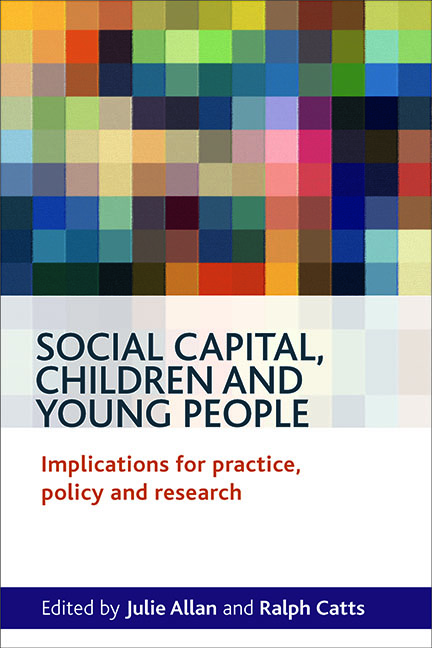eleven - Commentary: schools and social capital: implications for practice
Published online by Cambridge University Press: 01 September 2022
Summary
All four contributions in this section recognised the potential gains for young people of being part of social networks as well as the contribution schools and learning environments have made to identity formation. This chapter reflects on some common themes but also discusses distinct aspects of each contribution and implications for practice from a social capital perspective. Readers may pick up on different points and may indeed reflect differently on the same points that I have addressed.
Chapter Ten, by Lingard et al, with its focus on privileged settings, stands out from the other three and makes an interesting contribution to discussions about school and social capital. Lingard et al hoped that in exploring the nature of capitals in advantaged contexts, they would provide insights and learning points about the role of social capital from that of people who worked in disadvantaged and less powerful settings. However, the setting of those with privilege is so starkly different to those from very low income and marginalised communities that the primary impression is to reinforce how poverty and social class reduce life opportunities and chances. A feature that stands out is the way in which independent schools appeared to afford and inculcate into their pupils a belief that it was their right to succeed.
Relationships matter
The independent schools set out to nurture in their pupils a sense of self-belief. This they did by according the pupils membership of an institution rich in history, norms and traditions of which pupils could be proud. There appeared to be an embedded ethos of achievement that all pupils could aspire to and tap into, with the assurance that opportunities for academic achievement and employment both in Scotland and across the world were limitless. This was the ‘habitus’ created for these pupils. Money and privilege enabled much of this to happen and it could be said that it was not pupil social capital as such that was the catalyst for generating such cultural capital but the fact that these schools could draw from bridging social and other capitals that parents and the wider supporters of such schools could provide for the pupils. A phrase that Lingard et al used, ‘the cultural legacy of grounds, playing fields and architecture, and the artefacts contained therein’, aptly captured the wealth available not just of space but also of history.
- Type
- Chapter
- Information
- Social Capital, Children and Young PeopleImplications for Practice, Policy and Research, pp. 199 - 208Publisher: Bristol University PressPrint publication year: 2012



